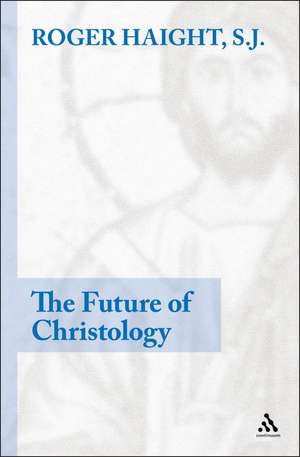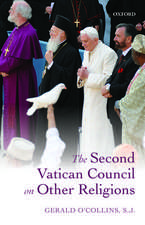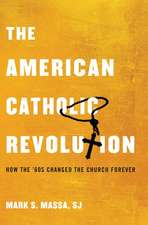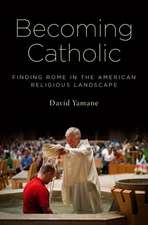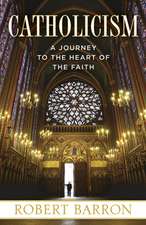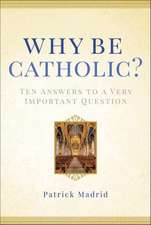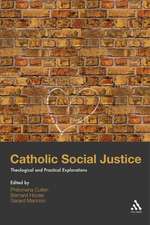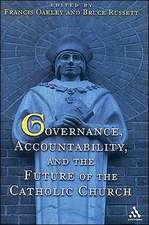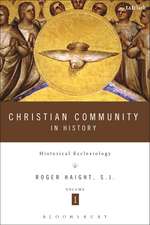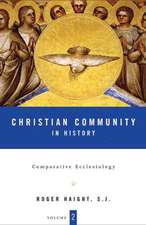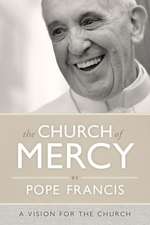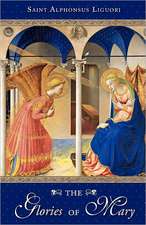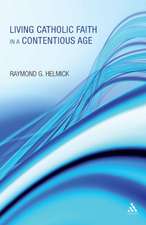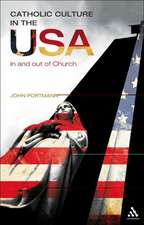The Future of Christology
Autor Rev Prof Roger D. Haighten Limba Engleză Paperback – 2 oct 2007
Preț: 224.11 lei
Preț vechi: 288.55 lei
-22% Nou
Puncte Express: 336
Preț estimativ în valută:
42.88€ • 44.77$ • 35.49£
42.88€ • 44.77$ • 35.49£
Carte tipărită la comandă
Livrare economică 04-18 aprilie
Preluare comenzi: 021 569.72.76
Specificații
ISBN-13: 9780826429278
ISBN-10: 0826429270
Pagini: 224
Dimensiuni: 152 x 229 x 16 mm
Greutate: 0.34 kg
Editura: Bloomsbury Publishing
Colecția Continuum
Locul publicării:New York, United States
ISBN-10: 0826429270
Pagini: 224
Dimensiuni: 152 x 229 x 16 mm
Greutate: 0.34 kg
Editura: Bloomsbury Publishing
Colecția Continuum
Locul publicării:New York, United States
Caracteristici
Controversial Catholic scholar Roger Haight brings us the ideas presented in his award-winning, best-selling Jesus Symbol of God, in a compact and accessible format which will appeal to a much wider audience
Cuprins
1. Jesus Research and Faith in Jesus Christ 2. The Logic of Christology from Below 3. Human Freedom and a Christian Understanding of Salvation as Liberation 4. Notes for a Constructive Theology of the Cross 5. Catholic Pluralism on Religious Pluralism: Rahner and Schillebeeckx 6. Jesus and Church Mission 7. Outline for an Orthodox Pluralist Christology 8. Two Types of Christology 9. The Future of Christology Epilogue: Jesus Symbol of God: Criticism and Response
Recenzii
"Dr Haight offers helpful interpretationsof the theologies of Rahner...this series of notes to one of them will prove helpful to many. Libraries will consider the big book a priority and this one a useful extra" Theological Book Review Vol.19 no.2 2007
The Catholic Press Association 2006 Book Awards3rd place for a Liturgy title
"In The Future of Christology, Roger Haight provides a collection of essays that address salient themes from his monograph Jesus Symbol of God (JSG) (Orbis, 1999). Intended for an audience that does not necessarily include professional theologians, the book represents a recapitulation of the ideas and a response to the critiques raised by his provocative monograph. This apologetic undercurrent notwithstanding, members of the Catholic community as well as college and university students seeking dialogue with contemporary cultural and pluralistic worldviews will find this collection stimulating and insightful. Several chapters are noteworthy for their challenge to prevailing discourse and for the groundwork they lay for constructive theology. His chapter "Notes for a Constructive Theology of the Cross" raises significant questions concerning the meaning of the symbol of the cross, the spirituality and asceticism engendered by the cross, its necessity in the economy of salvation, and the understanding of God as willing the suffering of the cross as a means to salvation. Haight offers preliminary "notes" in response to these questions which disabuse the reader of the glorification of suffering and sacrifice that elicits devotion and perpetuates self-negation in hope of future reward. Haight suggests that it is not the cross that saves, but that "god saves in spite of and in face of the cross" (92). In this context, Haight proposes an intriguing reading of the Pauline understanding of the cross, of kenosis, and of Jesus as the second Adam. "A further issue that shapes many of Haight's considerations is that of pluralism within Catholicism; between Catholicism and other Christian traditions; and among Catholicism, Christian traditions, and other world religions...Particularly lucid is his description and interpretation of the consciousness that comprise a post modern world view -historical consciousness, social consciousness, pluralist consciousness and cosmic consciousness -and that serve as "a lure to create new construals of Jesus Christ and the Church that meet the temper of our time" (130). Finally Haight brings his understanding of the postmodern consciousness to bear on an "Outline for an Orthodox Pluralist Christology" of Jesus as the revelation of "a savior God who wills the salvation of all whom God created" and as "the historical efficacy of that divine and salvific initiative" (159)...Haight's work offers a timely reply to vital questions voiced by an expanding number of faithful and, in so doing, stimulates thought and dialogue in turn".
mediocre review
The Catholic Press Association 2006 Book Awards3rd place for a Liturgy title
"In The Future of Christology, Roger Haight provides a collection of essays that address salient themes from his monograph Jesus Symbol of God (JSG) (Orbis, 1999). Intended for an audience that does not necessarily include professional theologians, the book represents a recapitulation of the ideas and a response to the critiques raised by his provocative monograph. This apologetic undercurrent notwithstanding, members of the Catholic community as well as college and university students seeking dialogue with contemporary cultural and pluralistic worldviews will find this collection stimulating and insightful. Several chapters are noteworthy for their challenge to prevailing discourse and for the groundwork they lay for constructive theology. His chapter "Notes for a Constructive Theology of the Cross" raises significant questions concerning the meaning of the symbol of the cross, the spirituality and asceticism engendered by the cross, its necessity in the economy of salvation, and the understanding of God as willing the suffering of the cross as a means to salvation. Haight offers preliminary "notes" in response to these questions which disabuse the reader of the glorification of suffering and sacrifice that elicits devotion and perpetuates self-negation in hope of future reward. Haight suggests that it is not the cross that saves, but that "god saves in spite of and in face of the cross" (92). In this context, Haight proposes an intriguing reading of the Pauline understanding of the cross, of kenosis, and of Jesus as the second Adam. "A further issue that shapes many of Haight's considerations is that of pluralism within Catholicism; between Catholicism and other Christian traditions; and among Catholicism, Christian traditions, and other world religions...Particularly lucid is his description and interpretation of the consciousness that comprise a post modern world view -historical consciousness, social consciousness, pluralist consciousness and cosmic consciousness -and that serve as "a lure to create new construals of Jesus Christ and the Church that meet the temper of our time" (130). Finally Haight brings his understanding of the postmodern consciousness to bear on an "Outline for an Orthodox Pluralist Christology" of Jesus as the revelation of "a savior God who wills the salvation of all whom God created" and as "the historical efficacy of that divine and salvific initiative" (159)...Haight's work offers a timely reply to vital questions voiced by an expanding number of faithful and, in so doing, stimulates thought and dialogue in turn".
mediocre review
